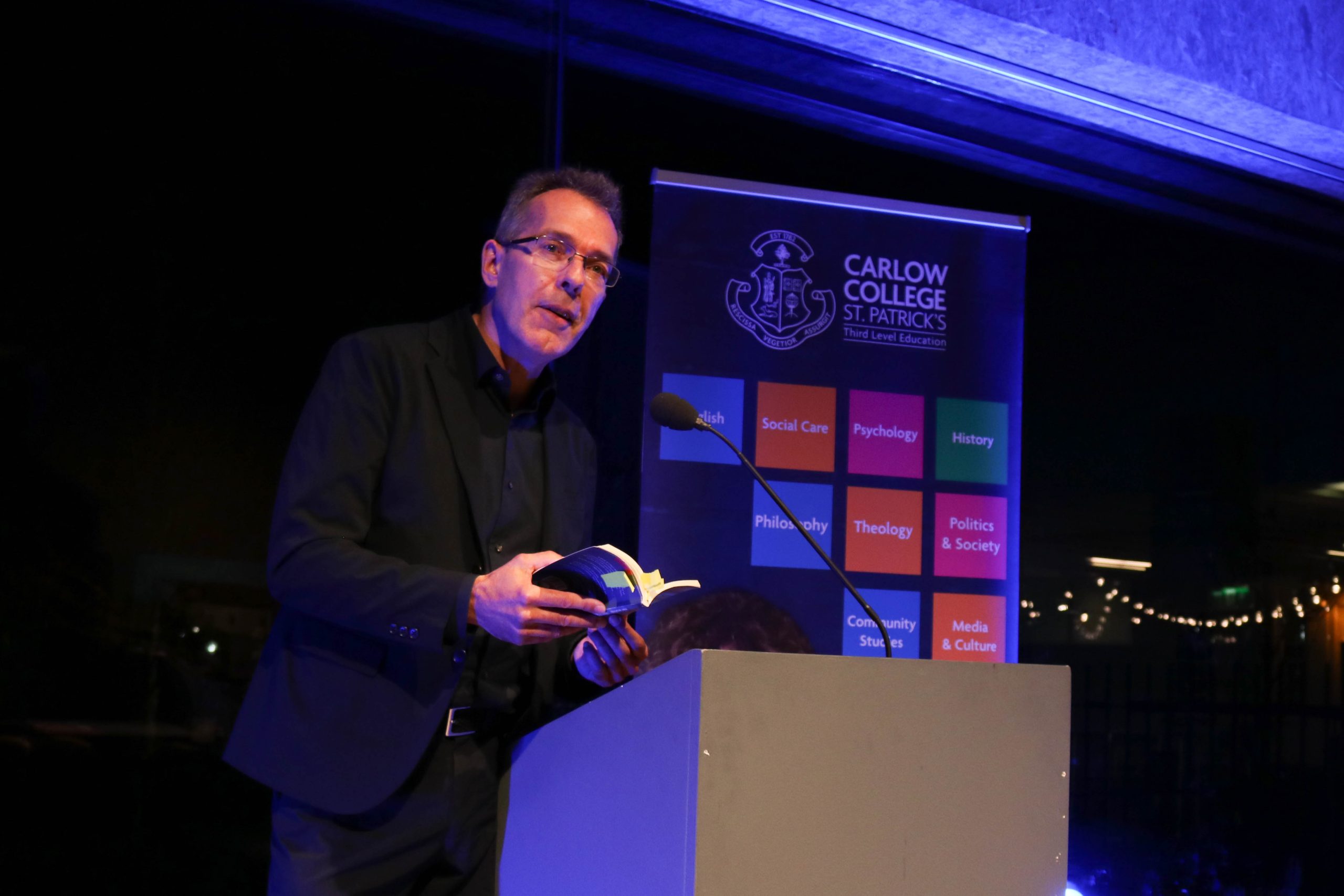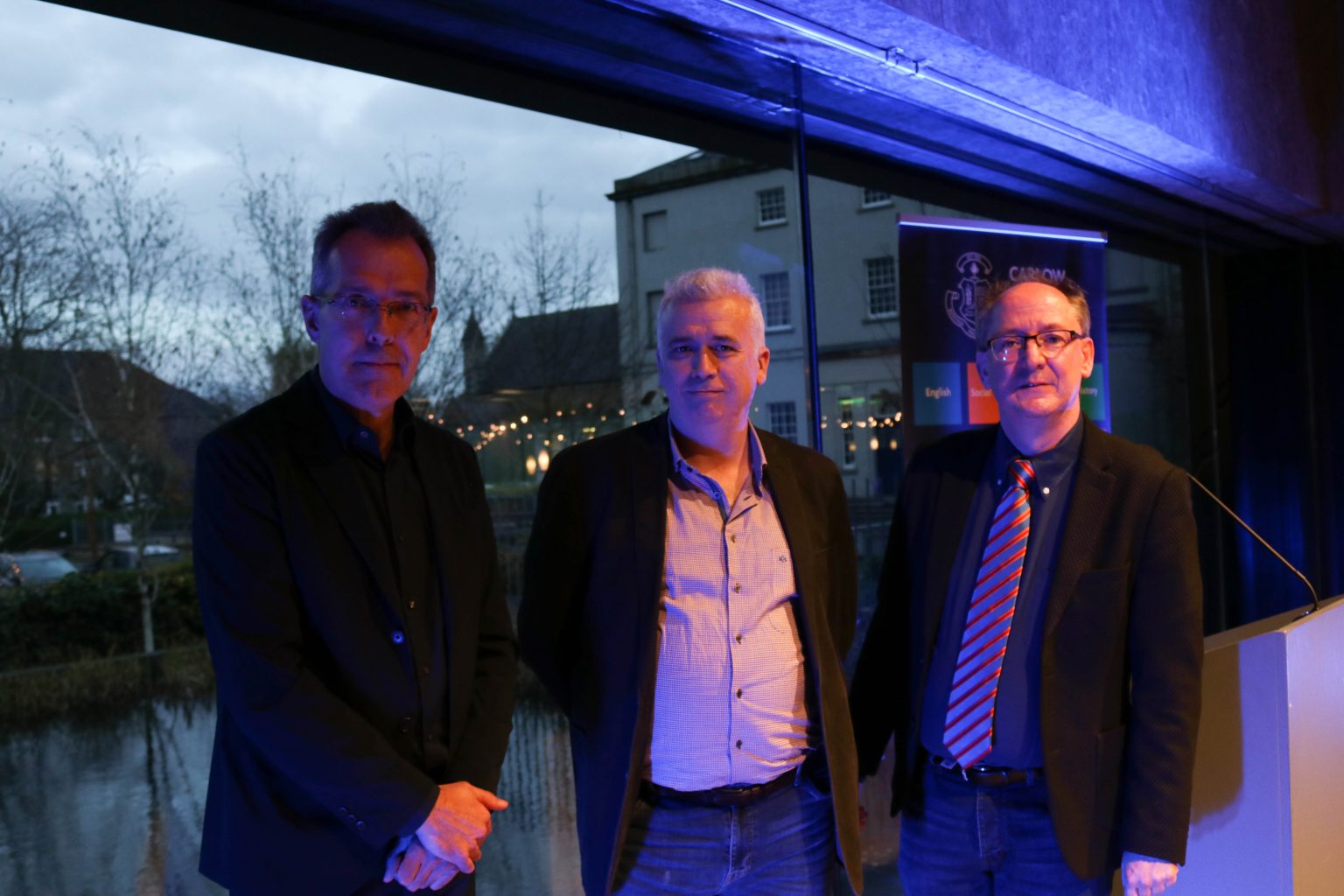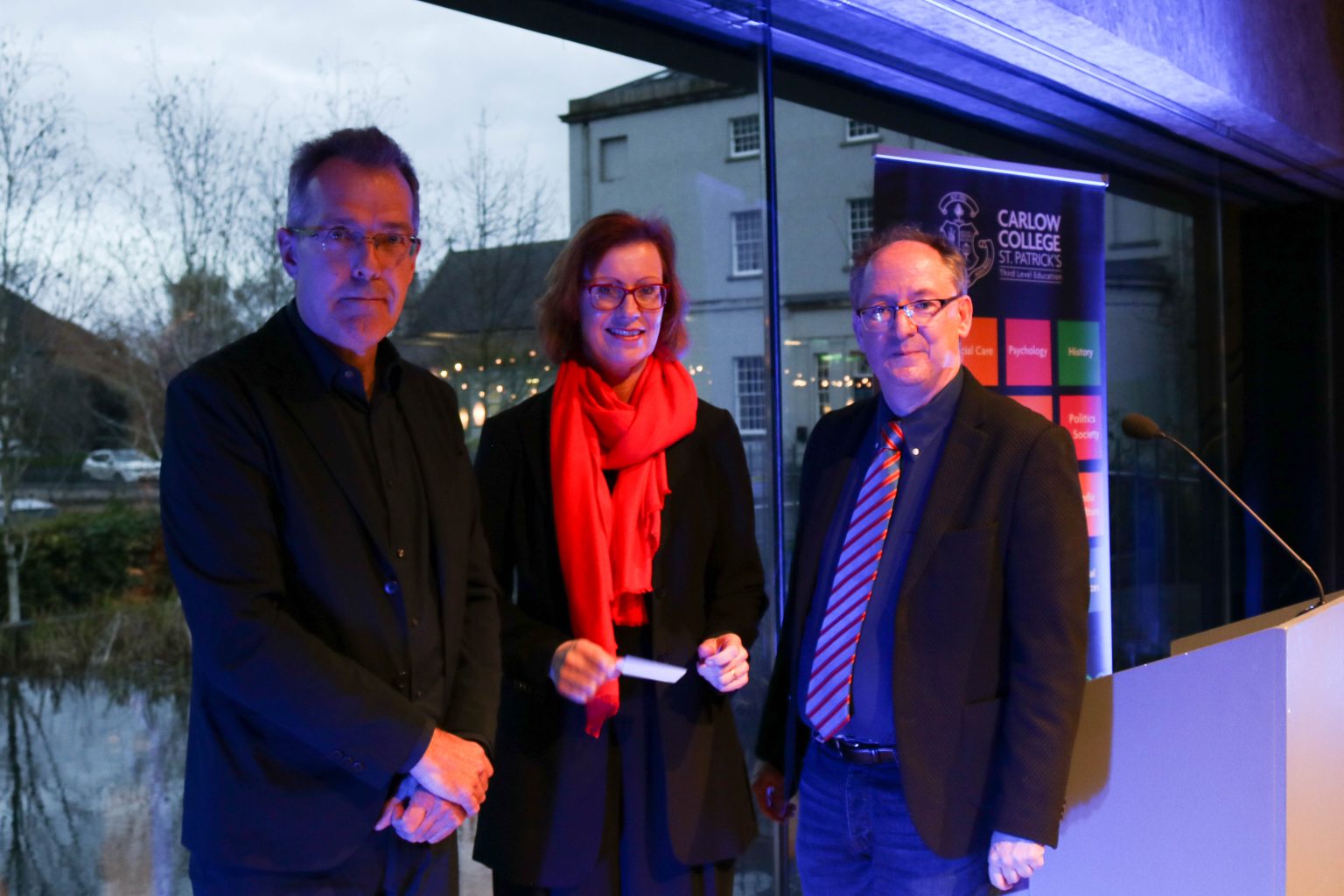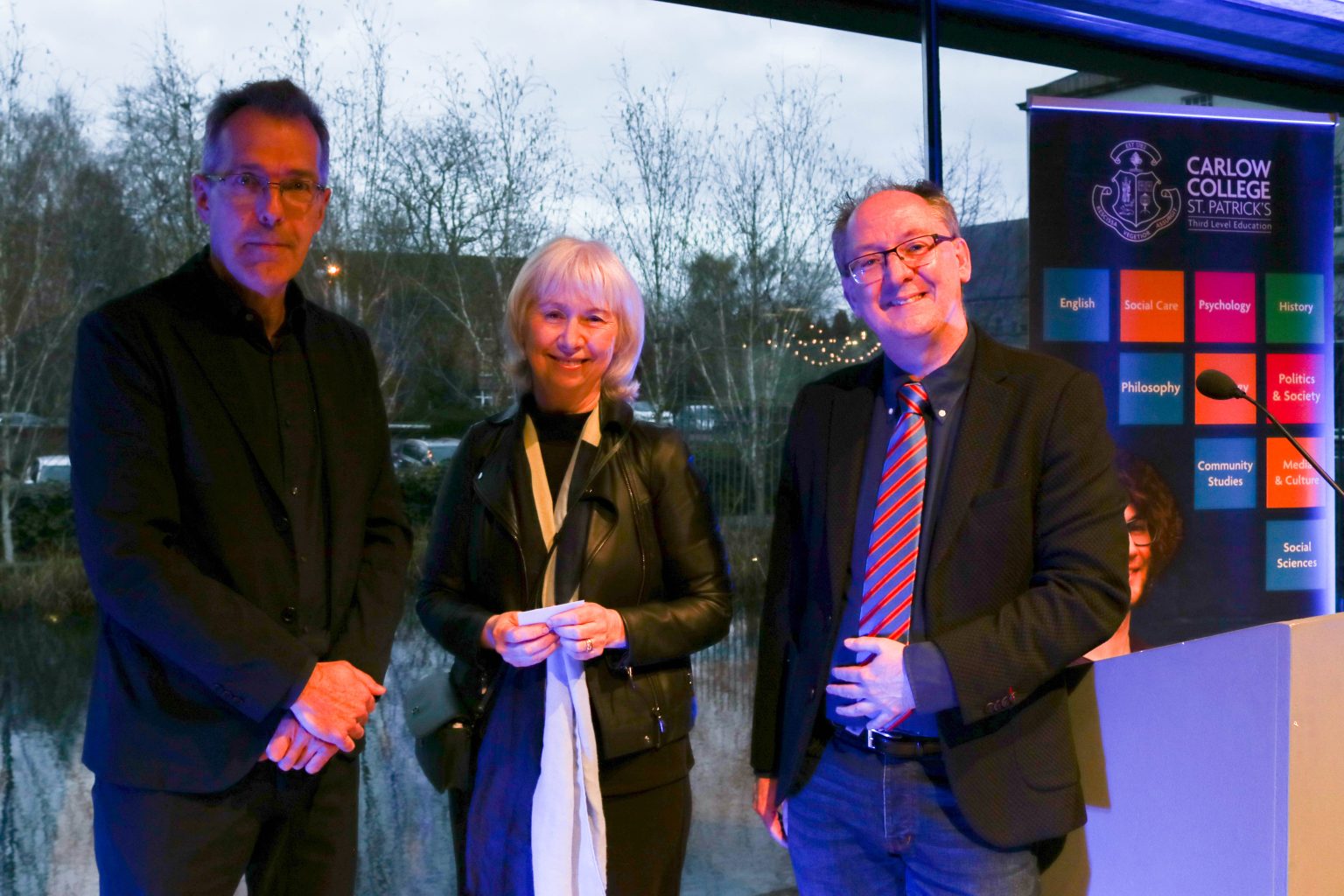Carlow College, St. Patrick’s hosted its Annual Literary Awards and Creative Writing Showcase in VISUAL on Monday 3rd April. This annual event gathers together the College literary community for a night to recognise and celebrate the creative writing talent of its students with awards presented for best in prose and poetry writing over the past year. This year’s awards were presented by renowned poet and editor, Pat Boran.
Friends and family, staff, students and past graduates of Carlow College, were in attendance for what was an engaging and entertaining evening. The night opened with members of the Third Year Creative Writing class presenting a showcase of their writing. The class gave a series of readings of poems, as they provided a dramatic, moving, and varied showcase of their work.
Speaking at the awards Lecturer in English, Dr Derek Coyle, commented on ‘how exciting it is to see a new generation of Irish writers discover their voices. Creative Writing gives people a way to articulate and explore what it is they want to say. The Literary Awards helps provide a vehicle for this. This event is organized along fully professional lines and gives our students a valuable insight into, and first-hand experience of, how literary competitions work, and what is involved in being active on the literary scene.’
The following Awards were presented in the categories of Poetry and Prose
Poetry Winners
She wipes mashed carrot
from the Formica table-top
peeling at the edges
gathers the goop and slops it into the bin
fruit fly dive in.
She picks food lumps from the counting beads
of the hand-me-down highchair
gets an old toothbrush and scrubs each bead
as if it were
the only tooth left in her head.
Upstairs, in the bedroom, is a wardrobe.
In it hang skin-tight blue jeans
and a stripey cheesecloth shirt—faded.
Tan leather platform boots wait at the door
zipped up and ready to leave.
In a room across the landing lies her sleeping baby.
In the sky; the sun has gone to the other side.
Where to start?
I put on the kettle,
coffee comes first.
I sit at the counter,
the news desk, the first
with the scoops.
The agony page:
advice, explanations
and negotiations.
Her pristine house
is pulled asunder.
If she saw what we skipped!
Meanwhile, she’s washed up,
shipwrecked,
alone in the hospice.
One by one, I close
each door.
My freezing room,
where I smoked
out the window;
her room, empty
and silent.
And finally,
the kitchen,
this counter,
where the coffee
grows cold.
Elizabeth Cope hangs
on spare, white walls.
A body of work
inspired by menopause.
African colour splashes
of deepest orange, rich red.
Flailing female limbs
primal, carnal, Visual.
Standing either side
of the singing lobster
Sarah, noble princess,
at the threshold of adulthood.
Susan, purity and strength.
Her graceful defiance earned
in the loss of a child.
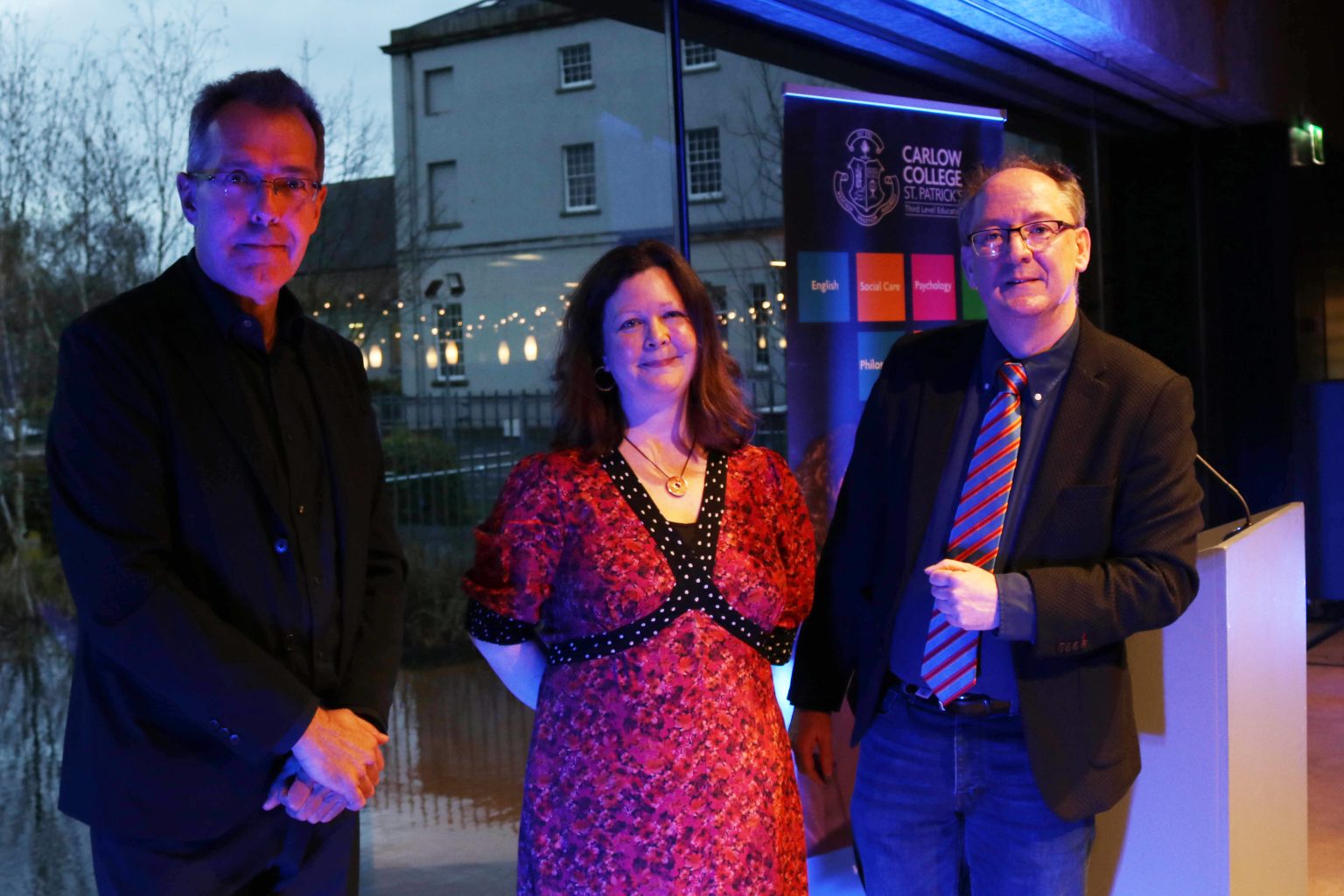
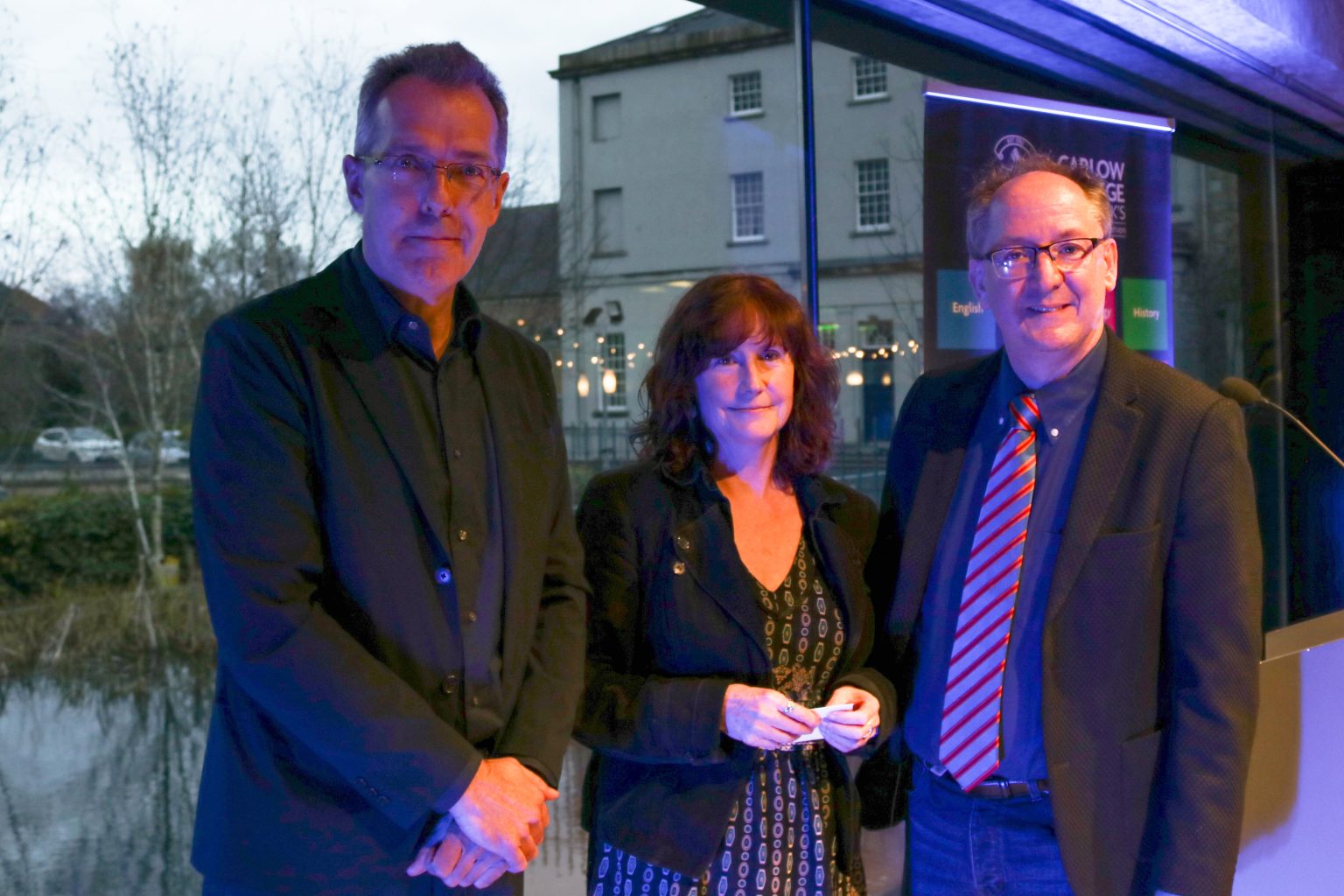
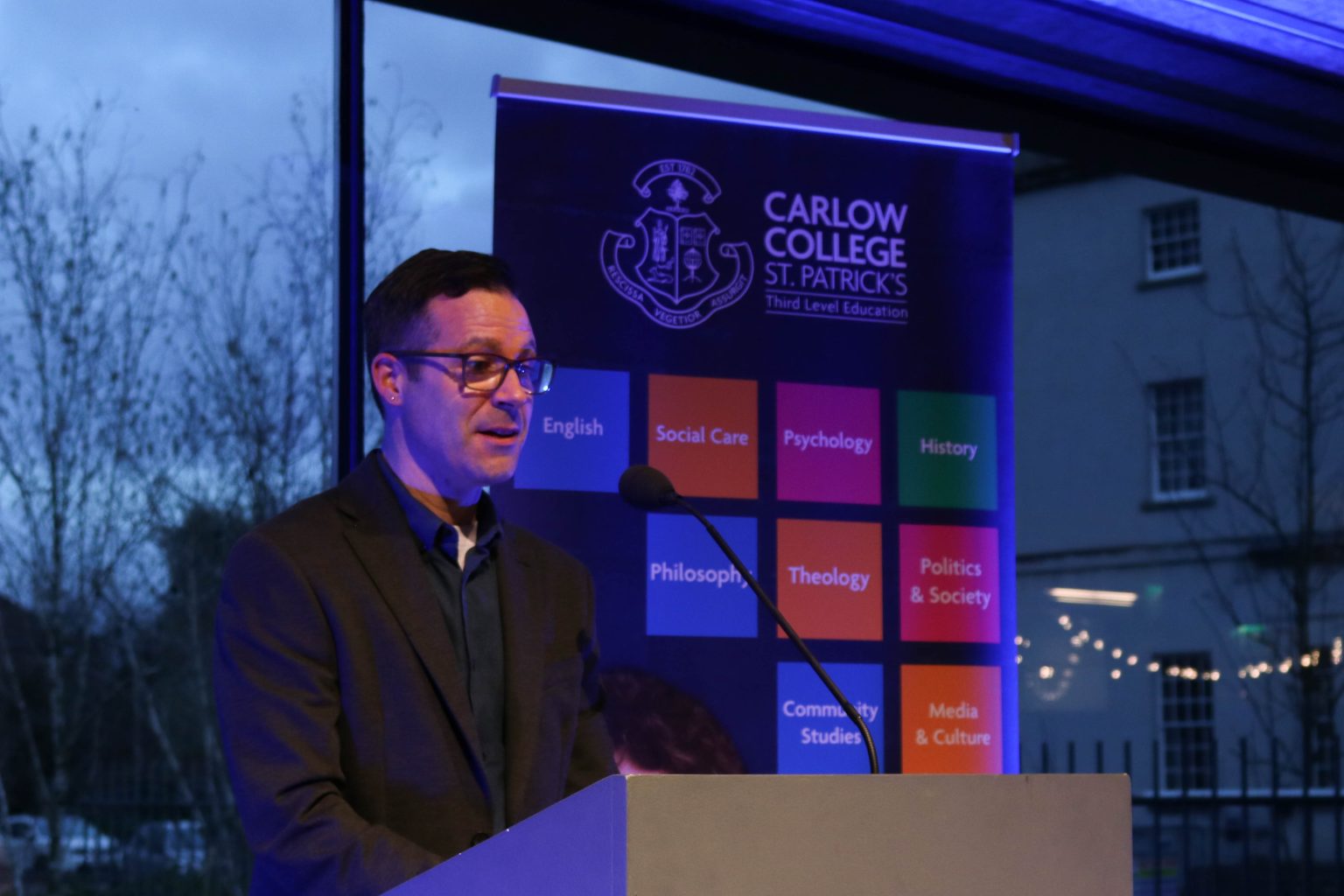
Prose Winners
Edward is ten years old. He is standing outside Mrs Johnston’s flat in Oliver Bond on the edge of a cheering crowd of onlookers. Above the Johnston’s flat in S Block, leaning over the balcony, his dad and some other neighbours are watching the proceedings unfold below. The bride, Jacinta Johnston, is standing at the doorway. Edward watches as she hugs and kisses her mother and, waving to the throng, is assisted by her groom, towards the waiting ivory and cocoa coloured Benchley. The car reminds Edward of a gangster car in one of those black and white movies his dad watches. The bride is tearful. In her white frilly dress, she looks like an oversized puffy sheep. Her skin is bronzed. Her hair voluminous. The groom, assisting her into the car, is all smiles. He is wearing a dark suit. His hair is shaved at both sides but long at the back and he is sporting a skinny black tie. He reminds Edward of Ian Rush. Men vigorously pat his back as if he has performed some sporting feat. To loud cheers the car pulls away slowly. Some children are still searching the road for coins the best man had earlier thrown into the air to the waiting children and to which, in chorus, they had shouted in a loud and joyous yawp, GRUSHY, before descending on the coins pell-mell. Edward’s pockets are heavy with collected coins. A conglomeration of pennies, ha’pennies, fivepences, tenpences and one fifty pence piece. With his hands in his pockets, holding his trousers up, Edward follows the car along with other children shouting good luck. The car picks up speed as it turns around R Block. The children try to keep up. Some of the children climb the steep steps leading to the playground to catch up with the vehicle as it makes its way to exit through the gate at P Block. Edward is standing at the steps to the playground. He is forbidden to go any further. He imagines seeing Jacinta wave one last time before she disappears into her new world. Turning, he walks back down to R Block. Children are counting their money. With the coins weighing his trousers down he is intending to leave the flats through the archway between S and T Blocks. Standing at the Foley’s flat he peers around and spies his dad still on the balcony outside their own flat. His dad is still talking to neighbours. Edward walks back to the stairwell of R Block. Gerry asks him how much he got. Edward’s words stall as he tries to form his sentence.
“Ha-have to count it,” he says, as Gerry says he made “four pounds and tenpence,” before disappearing up the stairwell.
Sitting down on the steps overlooked by the abandoned brewery and hidden by the shadows created by the stairwell, Edward decides to wait his dad out. Reaching into his pockets, he takes out all the change he has gotten from the grushy and begins to count the money.
With just shy of five pound it has been a good grushy for Edward. The tenpences he sets aside in his right trouser pocket. These, he tells himself, he will use to play arcade games in O’Rourke’s Newsagents. The rest of the money, two pound twenty-six pence, he dispenses between his other pockets for ballast. These he will spend on sweets in Egan’s and Mary’s shops as these shops, unlike O’Rourke’s, have no video arcade machines. All three shops are on the block outside Oliver Bond. The shops are ringed by Usher Street, Bridgefoot Street and Usher’s Quay. Edward plots a route: he will go out under the arch, then he will cross over Usher Street keeping close to the garage, then passing Foley the blacksmith and the fish wholesalers turn around to O’Rourke’s where he will play Space Invaders and Pac-Man; after that, he will walk down to Mary’s and grab a couple of Macaroon bars which she sells and Egan’s don’t, otherwise he wouldn’t set foot in Mary’s, which is small and crampy and smelly. A lot of kids are fearful of Mary. If Edward’s mother sends him to the shops for bread he must go to Egan’s and if Egan’s don’t have what his mother wants, he is to go to O’Rourke’s, but he is not to go to Mary’s. Mary has grey-scraggy hair, and chin hairs. Above her head, hanging from the ceiling, which is yellow with smoke stains, there are fly strips festooned with flies. Only her head and chest, which is huge, appear above the countertop. Edward’s brother told him that below her tits her body is that of a slug. And that she is known to eat children. She reminds him of Mrs Twit. On her chin is a large wart with a scraggly beard. But Mary sells Macaroon bars and Macaroon bars are good. After Mary’s he will go to Egan’s where he will buy Tayto, gobstoppers, and bullseyes. These he will share with his brother.
Nervously, Edward peers around the edge of R Block to see if his dad is still on the balcony. The front door is open, but his father is nowhere to be seen. Edward knows he should always be within shouting distance of his parents calling out his name. With his mother in town buying his brother’s confirmation suit, his dad is minding him. Being Saturday, his dad will be busy watching football on television. Quickly, Edward shoots across towards the arch hiding between the drying clothes and bedsheets flapping among the forest of metal poles on which the clotheslines hang and, hesitating but a moment, darts through the arch between S and T Blocks. The wind under the arch roars at him, almost pushing his slender frame back into the flats. His cardigan flaps like a cloak, the zip hitting his lip, his Hulk t-shirt rises showing his belly, so Edward pulls down his t-shirt and zips his corduroy cardigan then wipes spittle from his nose onto his sleeve. Standing before the roadway, he looks up and down, making sure no cars are approaching. He glances behind expecting to see his dad. Thankful he is not there; he then looks up to the windows of his parents’ flat which overlook the street wondering if his dad is looking out the window. Seeing nothing and convincing himself his father is busy watching television; Edward then turns his attention to the street making sure his mother does not make a surprise appearance. If she saw him, she would tell his dad and he would be soundly beaten for disobedience. Clutching the money in his trouser pockets, he quickly darts across the street. Keeping close to the cars parked outside Madden’s Garage he peers around the blue gates into the yard. Not seeing his uncle Albert, who sometimes works here as a gopher, he sprints around the corner where he knows his dad cannot see him. Immediately, he is struck by the heat coming from Foley’s furnace. Ahead he can see the mill at Wattling Street. His father once told him that the mill had been a giant and that Don Quixote had killed it and cut the arms off the giant, that was why it had no sails. The giant was from Arabia, his father told him, which was why the green dome on top of the mill looked like a turban. Edward is unsure if the story is true. But then, Santa is real, so why would giants turning to stone in the Liberties not be true.
Passing the blacksmith’s, Edward hears the rhythmic clang of metal on anvil. At the foot of the closed black painted wooden door, he sees a soft warm glow emanate, a mixture of orange, red and yellow, like the Rothko painting his dad had pointed out to him when it was shown on television the other night. Where his face was cold in the tunnel of the arch, causing his nose to run, he now needs to turn away lest the heat from the furnace burns him.
He walks stealthily, always keeping close to the parked cars. He is conscious that, while he has avoided his dad, and his uncle Albert, there are other relatives living in the flats. Along this stretch of Usher Street, the back of D and part of E blocks windows look out like so many furtive eyes. Warily, he avoids the window of the ground floor flat at the entrance to D Block by ducking and diving behind parked cars along the street. The flat is occupied by his uncles Albert, George, and his namesake Edward. Having avoided Albert, he is only worried about his uncles Edward and George. His uncle Edward doesn’t work and is likely in the flat cooking the Saturday stew for his two brothers. George will be there too probably watching Bonanza on the television.
Nearing the top of Usher Street, Edward starts to pull his cardigan up over his mouth and nose to avoid the stench of fish coming from the wholesaler’s. He peeks in as he passes. Dead fish lie in open crates. Some men wearing white bloodied aprons walk about holding gutting knives. Others lift crates packed with ice onto waiting trucks while gulls’ flap eagerly overhead chuckling in excitement. Rounding the corner on to Bridgefoot Street, Edward pulls the cardigan away from his face and breathes deeply. He smells his cardigan, and the smell of fish still lingers.
With the sound of gulls in his ears, Edward must squeeze through the entrance to O’Rourke’s because the shop is packed. The shop is owned by three brothers. Edward doesn’t know their names. He refers to them as Surly, Grumpy and Happy. Happy is chatting to a customer. Surly is watching the group of children hogging around the two arcade games. Grumpy is slicing ham on the meat slicer while talking to a customer. The three brothers live above the shop. They do a great trade as they are between Oliver Bond and the New Flats and not far from Queen Street bridge. The New Flats run along Island Street. Edward has relatives here too. That day Edward’s father had told him about the giant, they were walking to Wattling Street flats to visit cousins and Edward had asked why the street opposite the New Flats was named Island Street.
“It’s because,” his dad said, “there’s an island underneath us. After they walled the river Liffey the island disappeared. That’s why the road by the Liffey is called Usher’s Island.” Edward’s dad pointed out the woollen factory telling him that the abandoned building overlooking Oliver Bond, which Edward knew well from playing in, had once been a woollen factory and then a brewery. “All this area,” his dad said, sweeping his arms around, “was industrialised and served by impoverished Huguenots, labourers from the inner city and east European Jews.”
Having squeezed his way into the shop Edward is standing by the counter at the back of the shop nearest the Pac-Man video arcade machine. Edward sees very little of the screen but reckons the boy playing the game must be doing well for the other boys surrounding him are egging him on. When Edward leans in to get a closer look one of the boys he leans against turns and pushes him away and angrily curses at him.
“Get the fuck away from me ya homo.”
Edward backs away, embarrassed by this sudden confrontation. He is even more embarrassed when he sees Grumpy and Surly sniggering having seen him pushed. Some of the boys’ stare at him. Then, turning their attention back to the game, he hears his accuser tell one of the boys that he was feeling him. He is again called a ‘homo,’ and a ‘queer.’ The boys’ close ranks. They are rough looking. One of the boys starts to mimic a stutter, “dud-duh-duh-duh-duh,” he crows. And those around start to laugh and mimic the stutter of Edward’s uncles Albert and George.
“Ber-ber-bert-ti-Ni-ni-ni-niven,” one of the boys’ cries loudly to a rapturous chorus of laughter. Edward does not know any of them. But the mimicry underlies they know who he is. They know of his uncles Albert and George and their speech impediments. Moving closer to the Space Invaders game, the one nearest the entrance to the shop, there is again a large group of boys huddled about it. Keeping his distance, Edward is unable to see anything of the screen. He is fearful of being singled out again so stands on his tippy toes at the edge but to no avail. Giving up, he stands idly. Customers come and go, and he wants to leave but does not want to leave if people are watching him. When he sees Grumpy bend down to retrieve something behind the counter, Edward edges closer to the entrance where, believing no one now will notice him leave the shop, he steps out into the street and glumly walks down to Mary’s.
Poking his head inside Mary’s he sees two older boys from the Bond: Liam Casey and Robert Delaney. Seeing Edward, and knowing him, they have all played together, either football in the flats, or in the abandoned brewery, the two boys turn to Mary and Edward sees Robert say something to which Mary snorts. Stepping inside Edward says ‘hi’ to Liam and Robert. Putting his hand in his pocket and shuffling to avoid standing beneath the overhanging fly strips, Edward is momentarily discombobulated.
“What can I get you,” Mary snaps.
Startled, Edward’s hand fumbles in his trouser pocket for the fifty pence piece. Securing it, he holds up the fifty pence and says, “c-c-ca-can I ha-have t-two macaroon bars.”
“Yea-yea-yea-yeah you can,” Mary says laughing.
All three laugh. Edward stammers when he gets excited. Every Friday afternoon, when he was about seven, his mother used to take him to Temple Street Children’s Hospital where Sister Mary provided speech therapy. Breath slowly, she would tell him, enunciate your vowels. Give your brain time to catch up with your mouth, Edward. Now, slowly repeat after me. Edward’s stammer was mild compared to that of his uncles Albert and George. Mary snatches the fifty pence from his hand and throws two macaroon bars on the countertop while she rings the money into the till. When she turns round with his change Edward is gone. Even as he passes Condron’s pub the laughter continues in his ears. Glancing awkwardly at the Queen Street bridge, the busy traffic shooting along the road towards Heuston Station and beyond, a slight stench rising from the Liffey, Edward remembers how two years earlier John Dawe from the flats had been killed when, standing at the traffic light on the bridge, a truck mounted the kerb while turning and dragged John under its wheels crushing him. News spread in the flats about an accident and children ran out of the flats to see what had happened. Edward saw a fireman scooping something off the road and place it delicately in a black bin liner held open by another fireman. Edward knew instinctively that what was being placed in the bag was all that remained of John. A boy he had barely known but someone who, just a few days before, he had played alongside with on the coal heap set against the wall of the old Marshalsea Barracks by the New Flats. Try as he might, Edward could not remember John’s face. On the railings outside all the entrances to Oliver Bond, there was placed a card announcing John’s death. Edward was in school the day of the funeral. The cards were never removed. They just faded away. In the end, the elements washed all memory of him away.
Nearing Ganley’s, one of two wastelands on which children play, the other is the abandoned brewery, Edward notices a bronze-coloured Ford Capri mount the kerb and come to a stop. Bags that, Edward says to himself as he glances through the security fencing to see if anyone is playing inside. But the game of bagging has no meaning unless others are about. With his hands in his pockets, memorising what to ask for in Egan’s because he doesn’t want his stammer to reappear, and about to pass the car, he sees the occupant lean across the passenger seat and roll the window down.
“Hello. Are you from around here?”
The voice is soft and delicate. The accent nondescript. The young man is sprouting a Ronnie. He is wearing a shirt and tie, slacks. A blazer lies neatly folded on the back seat covering a black leather case.
“Yeah,” Edward says, warily, “I live t-there.” He points to T Block which overlooks the Liffey.
“What’s your name?
“E-E-Ed-Edward.”
“That’s a beautiful name. Now Edward, I’m lost.” The man says, looking down to where Edward pointed and then up towards Condron’s pub. “I wonder if you could help me like a good lad. I’m trying to find the Phoenix Park.”
“That’s s-straight u-up the road,” Edward says, pointing in the direction the traffic is travelling.
“Like I said, I am not from around here Edward.” Again, the man looks up and down the pavement. “Could you show me how to get there? I need to drop a package off,” the man says, pointing at the briefcase on the backseat.
“I could drive you back here. I can give you five pounds.”
The man reaches into his trouser pocket and taking out a five-pound note, he proceeds to unfold it temptingly.
An emptiness, like a pall, descends on Edward. He feels his stomach tighten. It is not hunger he feels. It is something more primordial. Remembering his father had warned him never to talk with strangers, Edward steps back from the open window. Seeing this, the man leans forward some more and seems to elongate almost wormlike.
“You like sweets, don’t you? I’ll buy you some sweets if you show me to the park.”
Momentarily transfixed to the spot, Edward’s legs feel leaden. He looks to the ground sheepishly as if trying to answer a question. He sees Jacinta Johnston tearfully waving from the car surrounded by eager smiling men and a baying crowd calling out her name searchingly. His eyes dart. The roar of the traffic reminds him of stampeding bison. The passenger door clunks and slowly it begins to open. The odour from inside the car escapes. It is overpowering. The metal of the door is black with oil and grease, like black unwashed teeth. Finally forcing his legs to obey, Edward steps backwards, almost falling, and runs for home. He runs past Egan’s and across Usher Street paying no heed to oncoming traffic; there is none. He runs under the arch, the gushing wind aiding him, carrying him under and into the safety of the flats, where he runs up the stairwell to his dad.
“Dad, dad, someone tried to grab me,” he shouts, rushing through the hall door, which is unlocked, he pushes open the living room door.
His father comes out of the scullery. He is drying his hands in a tea towel.
“What did you say?”
His dad marches him out of the flats and over to Egan’s, but the car is gone, swept up by the rushing traffic. At first, Edward’s dad looks about where Edward has told him the car was parked. He watches his dad looking through the torn security fence ringing Ganley’s.
“Eddie, go back home.” The voice is angry. His dad’s countenance heavy. “I’ll deal with you later.”
Edward starts to walk home. His dad’s temper is up. He will get a hiding later, after his mother is informed, she will insist on it but make sure his dad doesn’t go too far. Looking sideways through Egan’s window, Edward sees the sweets. They are red, and orange, blue and yellow, green, and purple and white. All are neatly ordered and laid out like a butcher’s window display. Behind the counter he sees Mr Egan reaching for the jar of bullseyes. Before crossing the street, Edward reaches into his pocket and feels his money. Then he looks back towards his dad. His dad has his back to him. He is staring up Usher’s Quay. His father’s eyes following the traffic which follows the course of the snot green foul-smelling Liffey. The carrier of all the city’s waste. Dark clouds are appearing on the horizon. Rain is forecast and the washing will need to be brought in before it comes.
Yes she said yes I will yes and he was shocked to think he had won her, this beautiful woman with the lavender blue eyes, and he saw his future stretching ahead all sunlit fields, and then she asked him if he would fulfil some tasks for her, she wanted to know that their love would last forever and he said yes he would do anything for her.
There is a town in Myanmar, she said, in a ruby mining region that is closed off from the outside world, and if you could bring me back a special gem from there, I would know that your love is true, and he agreed and before he left she presented him with a gold ring inscribed with his name, and containing a GPS tracker, and so he travelled across Myanmar, and indeed it was a journey fraught with difficulty and danger, he travelled secretly and capture would mean most likely death, but it was such a landscape as he had never experienced, with gold tipped pagodas shining in the distances, and nights of navy velvet clustered with sparkling stars, and he located the precious ruby for her and when he arrived back to her she saw that he was no longer a genial executive but was leaner now with lines of hardship etched around his eyes, and she liked this new version of him even more than the previous one, and for a time they were very happy.
The day came when she told him it was time for the next quest and he paled and asked if it was necessary, he had suffered so much for her already, but tears filled her lavender blue eyes and she asked if that was the limit of his love, he said of course not, she was the most beautiful woman he had ever seen, her hands were soft and white and those amazing eyes, she said yes, it is easy to love me for my beauty, but I have been let down so often, and so he acquiesced, and she told him of a village in the Sahel region of Africa, wild and lawless, where he would find a rare thirteenth century terracotta figure belonging to her, and she longed to take possession of it again, and he set off to find it.
To keep herself occupied she sold the precious ruby, as she was no sentimentalist, and bought a luxury apartment in Chelsea and spent months decorating it, and tracking his movements and she noticed that twice he stopped moving for days, and in fact he had come near to death, once by disease, once by bayonet, in these scorching lands that seemed to burn him up and remake him, but fate it seemed did not wish him to die, and eventually he found the figure and brought it home.
On the day he turned up at her new apartment, they both cried with happiness and she saw that he was muscular now, with a deeply tanned face that had seen and suffered much, he was incredibly attractive, people stopped to look at him when he entered a room, and now she introduced him to her parents, and their future seemed rosy, so when she told him there was one more quest he resisted, and she said yes but quests always come in threes, and it would be unlucky to stop at two, besides this one is only a voyage from the coast of Norway to an island in the Lofoten archipelago, to retrieve a manuscript left there by my ancestors, he looked sadly at her, she was so beautiful but he thought some of her lustre had dimmed, and he felt so much older than her now, but he said to himself, after this quest we will be happy forever.
As he travelled through Norway his spirits lifted because he thought he quite liked a life of adventure, and hardship was a distraction from some of life’s more difficult questions, once again he suffered greatly and on the treacherous Arctic seas he was inevitably shipwrecked, and washed up on a bleak and empty shore, but he was saved by the island’s only inhabitant, she was so bundled against the cold, he wasn’t sure if she was a woman or a man, but as he recovered he saw her clearly, and she was like no other woman or even person that he had ever known before, and she told him of her hard life and how she had lost all she loved through wars and storms and illness, he was utterly intrigued by her, then one day, hardly a day at all, there was so little of it, the sky around him filled up with the Northern Lights, and as the green electricity flowed into his nose and his eyes and his ears, his body filled with this green ecstatic light and he knew that he could not return to the city streets and the cloying urban interiors he had left behind.
His fiancé waited for him until one day a postman arrived and handed her a tiny cream envelope, and when she saw it she staggered in grief against the door, and the postman had never seen anyone so beautiful, with her lavender blue eyes swimming with tears, and although he was married and had six children, he put that out of his mind and begged her to let him take her out for dinner, and she said yes, I suppose I might as well. But after she had closed the door and was alone, her face was bitter as she opened the little envelope and dropped the ring into a tin box with all the others, and she said to herself, I swear that the postman will absolutely be the last man for I have been vindicated, I have always been proven right and they have all let me down in the end.
Mary’s breath caught in her throat as the carriage pulled up in the Grand-Place situated in the busy centre of Brussels. She had thought that the buildings surrounding the square were magnificent by day but now the gaslights reflected magically in the diamond-paned windows of the grand buildings. Freddie had told her that they were originally constructed in the 1600s as guild houses for the skilled artisans of the town and Mary had never seen anything so old and impressive at home in Manchester. The imposing stone buildings had been repurposed as offices for local government and as cafes and shops which sold luxuries to the prosperous merchants and business men of the town and their families. Bustling Belgians hurried across the square in the cold winter air, hurrying to welcome the new year with family and friends. Mary and Freddie moved as fast as her new, uncomfortable, and ruinously expensive shoes allowed. They were late and hoped that their friends would have kept a place for them at their table at the ball. At least Freddie wished this, Mary might have been happier to sit with a table of strangers where she could talk and laugh and dance with Freddie without having to contend with Jenny and Karl Marx. Mary found Karl to be deeply intimidating but Jenny’s feigned concern that Freddie was taking advantage of her made her feel both unworthy and slighted.
Freddie noticed her hint of hesitation and look of apprehension as they approached the grand entrance of the Café au Cygne. He had reassured her many times of the regard with which the Marx family held her and emphasised to her that his regard for her alone would be sufficient to guarantee her a welcome at their table. Freddie tucked her arm under his, signalling their togetherness in a valiant but vain attempt to make her feel more confident. He looked so handsome and distinguished in his formal suit that she found herself wondering how she found herself partnering this gentleman to a ball. She knew his friends wondered too. Mary expected little warmth from Jenny, and knew that Karl would at best ignore her, unerringly picking up on Jenny’s social cues: in this, as in so much else, they were as one.
At least they would be joined by many of their wider social circle tonight as they gathered to celebrate the start of 1848. Moses Hess and Sibyl would be at the new year’s ball. They had always been kind to Mary, and she looked forward to chatting with Sibyl, whose roots, though not as lowly as Mary’s were far from those of the aristocratic Jenny. Freddie had told her how much he had learned from Moses when he had met him first in Germany. Ten years older than Freddie and from a Jewish background, Moses had thrown off his family as Freddie wished to do and he now worked to make the world a fairer place. Nicknamed ‘Rabbi’ Hess not just because of his religion but for the care he took to explain his radical new philosophy, he had ignited a passion in Freddie to change, not only his life but also the way the world worked. Hess believed (naively Mary thought) that all men were naturally moral and just, though he was as dismissive of priests and rabbis as the rest of Freddie’s friends. Recently however Mary had noticed a tension between Freddie and Sibyl for which she had not yet found any cause but that would have to wait. Mary smiled back at Freddie, refusing to let her worries take from the excitement of her first ball.
The wide silk skirts of her new gown were swishing around her legs, allowing the tormenting but extremely beautiful and frivolous shoes which Freddie had insisted on buying for her, peek out beneath. Now she understood why so many of the grand ladies in Manchester out shopping or taking tea looked so sour and disdainful. It wasn’t just the shoes pinching her feet, or the infernal corset which was clamped around her waist, or even the pins and clips which tortured her hair into ladylike ringlets and curls but the knowledge that her carriage must remain erect and her demeanour feminine and decorous in order to avoid the pursing of Jenny’s lips, a sure sign that she, Mary, had once again betrayed her lowly origins and her total lack of suitability to partner Freddie.
This was to be a special night for Jenny who had been involved in the organisation of this ball for the Workingman’s League. Originally set up by Karl and Freddie to encourage the education of the working class, it hoped to increase their involvement in the Communist League, furthering the cause of the revolution of the working class. Mary was not sure how a ball came into this but Jenny, who had been called ‘Queen of the Ball’ in her native Trier, planned to enlighten the dancers with a dramatic performance in which she herself would take part. Mary had little hope of understanding what was meant and would be dependent on Freddie to explain it to her. She was lucky that he liked to enlighten her and that her mind was quick to understand. Sometimes her understanding of and response to Freddie’s instruction was so alien to his way of thinking that it felt like they had inhabited separate worlds not just different countries. There were even times that she felt that they belonged to different species rather than merely different social classes. Mary knew that Freddie liked the company of women, all women, especially the pretty ones, but despite his roving eye, the attraction which had brought them together originally continued to bond them in a relationship which confounded all expectations. Even hers.
Passing through the grand entrance to the Café au Cynge her breath was again taken by the enormous, decorated tree in the lobby. Adorned with sparkling glass decorations and twinkling wax candles the sight was awe inspiring. Mary had heard of the reports in the newspapers that Queen Victoria and her family celebrated Christmas with such a tree, but her imagination had not conjured such magnificence as this. She barely had time to recover when Freddie led her into the ballroom, searching for Karl and space at his table. The room was full and noisy, and Mary was glad that Freddie had insisted that she dress appropriately for the occasion. Some ladies wore silk gowns with sparking jewels on their necks and ears, their arms covered with long silk gloves glittering with rings and bracelets. Mary pressed her arms behind her back to conceal their bareness and searched the room for a friendly face.
Halfway down the room she saw Stephan Born, recently arrived from his native Poland, who stood and gestured to two empty seats beside him. Freddie was disappointed that Karl had not kept seats for them but was surrounded by committee members and functionaries of the League. He was grateful to Stephan for keeping them a place. A gentle man who burned with conviction for the cause of the working man, Stephan welcomed them warmly. Mary relaxed in his company but suffered his constant rhapsodising about the virtues of Jenny Marx. He carried a torch for Jenny, poor man. He was declaiming about her dedication to the cause of the working class, which he saw as proof of the nobility of her character and of her lack of snobbish distinctions. Struggling to understand his strongly accented English, Mary was nevertheless grateful for the diversion from the interminable speeches in German, French and Dutch. Freddie cheered boisterously after Karl’s speech, whispering to her that Karl had been loud in his praise of the Belgian government and even of King Leopold, for giving shelter to the radical philosophers and artisans who had been banished by the repressive governments in their own countries. Jennie took the floor after Karl’s speech ended and recited a work which meant nothing to Mary but was received enthusiastically by the attentive crowd. Freddie was even more boisterous in his applause for Jenny. Even though he had little time for what he called ‘eddicated’ women, and would usually laugh heartily at such worthy declamations, Jenny’s exceptionalism was bound up with his absolute commitment to Marx and to the revolutionary ideas they shared.
As the orchestra tuned up to commence the dancing Freddie excused himself to go congratulate Karl and Jenny on their triumph. It had been a very difficult few years for them, but now with three healthy children and finally in receipt of funds from Karl’s mother, life looked to be set fair for their future. Freddie was gone for so long that Mary eventually became uneasy, twisting in her chair to see if she could catch a glimpse of him while Stephan chattered on about Jenny. Only giving him part of her attention, her ears pricked up when she heard him say that Marx had communicated to him Jenny’s concerns about Mary’s presence at the ball being construed by this working-class group as a manifestation of the abuse of working-class girls by their employers and their sons. Stephan himself had not seen any issue until it was pointed out to him, but he recognised and applauded the sensitivity of Mrs. Marx, saying that the cause needed to be aware of feminine sensibilities. Seeing her stricken face he hurried to assure her that while her relationship with Freddie was obviously not of this nature, the leaders of a new movement had to set an example and be aware of the appearance of things.
Mary paled, wondering if Freddie had left her – not just for the evening but for the future. This wouldn’t be the first time that their respective social positions had divided them, and while she knew that Freddie would someday find someone more suitable and leave her for them, she had resolved not to let the shadow of an unhappy ending darken the shine of their deepening attraction to each other. So, she had once again struck out far from home with him and hoped that she would not regret it. She could not imagine him leaving her abandoned and alone in a foreign country, but he idolised Karl Marx, who it seemed was now openly condemning their relationship at Jenny’s behest.
The orchestra began to play a beautiful waltz, the regular beat instantly recognisable to her because of all the practice they had done in the last week so that she wouldn’t make a show of herself at the ball because of her total ignorance of formal dancing. Karl and Jenny skimmed the dance floor in complete unison, Karl’s normal clumsiness masked by the grace of their oneness on the floor. Freddie returned to her, extending his hand, smiling and as loving as always and her fears melted. They took to the dance floor and her worries were swept away by the glorious music and the harmony of their bodies. It didn’t matter that she had only a tenuous grasp of the steps, her body was so attuned to Freddie’s that it followed his lead eagerly and intuitively. She was transported from the slums of Manchester to the magic of this ballroom in Brussels by this beautiful man. His goodness saw past the differences in the stations of their lives and he connected with her deepest self. They fit, she knew they did and she would have to put her faith in that.
They danced and drank champagne and all her worries were banished until they chanced upon Karl and Jenny on the floor, when Karl tapped Freddie’s shoulder, switching partners mid-dance. Freddie claimed Jenny as his partner leaving Mary to stumble her way into the arms of the ever intimidating Karl Marx. Glowing with self-satisfaction and mellowed by copious amounts of beer and wine, Karl adjusted his pace to her increasingly inept movements and he steered her carefully around the floor, seemingly unperturbed by her clumsiness. She had seen Karl reduce grown men to shivering wrecks with the power of his intellect and his absolute conviction that he was right. He brooked no opposition to his views from anyone and though he and Freddie agreed on everything and were the best of friends, there was no doubt whose was the more forceful personality. Karl was shorter than Freddie but more physically imposing. His hair was intensely black and the full beard he wore darkened an already swarthy complexion. His intense dark eyes seemed to see and to understand everything. He radiated conviction and energy and the power of his thoughts engaged Freddie’s desire to change the world and make it a better place for all.
She congratulated Karl on the reception of his speech and on Jenny’s organisation of such a splendid night and he seemed pleased with her compliments but there was to be no deflecting him from his intention. There was no escape from him now and Mary listened with the wariness of the street urchin to what he had to say. It seemed innocuous enough as Marx responded to her pleasantries with recollections of previous balls which he had attended with Jenny. They had met in Trier, Jenny’s home town, where her aristocratic family, the von Westphalens, topped the social hierarchy not just because of their wealth and breeding but because of Jenny’s beauty and grace. Karl locked eyes with her as he explained what Jenny had to forsake in order to marry him and how exceptional a woman she was. Her father had encouraged his daughter to develop her mind and had also encouraged her attachment to Karl. His death had made life more difficult for them but their commitment to their cause meant that they had no regrets. Jenny now had three small children to care for and in order to protect their innocence she would prefer if Mary kept her distance from the family. They hoped to appeal to her feminine instincts rather than bothering Freddie with this request and regretted if they caused any offence but their children must be sheltered from the ways of the world until they were old enough to understand.
The music ended as Karl completed his speech and he bowed to her, extending his arm to escort her back to Freddie. Stunned, Mary curtsied, took his arm and moved through the crowd. She straightened her back, adopting a mask of composure as they approached Freddie and Jenny. She knew how Freddie idolised Marx and was not about to force him to make a choice. She knew how that would go. Marx was messianic in his commitment to his new philosophy and Freddie was just as fanatical. Their relationship was far more important than the feelings of any woman. Mary felt a new sympathy for Jenny seeing her face light up as Karl approached.
Karl smiled at his beautiful wife and his devoted acolyte, and patted Mary’s hand before placing it on Freddie’s arm. Mary looked at this great man and knew that he would change the world. Who could resist the force of this personality, the strength of his ideas? She had just been warned off by him and she knew now that she would only share that part of Freddie’s life which Karl did not dominate. Freddie was a good man and Mary could see that he would follow wherever Marx would lead. In his eyes she could see the devotion which she now felt in her turn for him. It would have to be enough, for she loved him with all her heart.
Whatever this new year might bring the only thing that she could control was her feeling for this man and her wish that he would be happy. She could only wish as the countdown to 1848 began, that the power of love would temper the power of the coming revolution. Mary resolved that although change would undoubtedly come, her love would endure. As the clocks chimed midnight and couples all across the floor embraced, she put away her fears and leaned into Freddie whispering, ‘I love you Freddie, you may change the world but you’ll never change that.’
Following the Awards, Pat read a selection of his work. After a question-and-answer session, Carlow College, St Patrick’s students with literary ambitions were left with plenty to consider and with the doors of inspiration opened.
Full details of the Awards winners and their winning pieces are available at www.carlowcollege.ie/student-literary-awards

